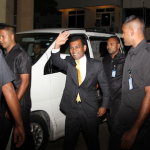The conviction of former President Mohamed Nasheed on terrorism charges was “grossly unfair” and highlighted “judicial politicisation,” the International Commission of Jurists (ICJ) have said in a press release today.
The opposition leader was sentenced to 13 years in prison on March 13 over the “kidnapping or abduction” by the military of Criminal Court Chief Judge Abdulla Mohamed in January 2012.
“The Maldivian judiciary’s independence has been compromised for years by serious pressure from the government, and this grossly unfair conviction highlights the numerous problems with the politicization of the judiciary in the country,” said Sam Zarifi, the ICJ’s Regional Director for Asia and the Pacific.
“It is crucial for Maldivian authorities to allow Mr. Nasheed to appeal his case effectively, with transparency and monitoring by Maldivian and international observers.”
ICJ contended that trial was marred by “gross violations of international standards of fair trial, including Article 14 of the International Covenant on Civil and Political Rights, to which the Maldives acceded in 2006.”
Among the violations listed by the ICJ included two of the three judges presiding over the trial having testified in the 2012 investigation, denial of legal representation for Nasheed during the first hearing on February 23, and the denial to the defence team of both full access to evidence and state witnesses and the opportunity to consult with Nasheed.
Moreover, ICJ noted that the court denied Nasheed the opportunity to seek new representation after his lawyers quit in protest of the court’s refusal to grant sufficient time to mount a defence.
“The defence was also denied the opportunity to call its own witnesses,” the press release added.
Following Nasheed’s conviction, President’s Office Spokesperson Ibrahim Muaz Ali told Minivan News that the president could not “interfere in judicial proceedings and is not to blame for court proceedings,”
“If you study this case, from the beginning to the end, it is clear the charges are not politically motivated,” Muaz insisted.
President Abdulla Yameen meanwhile called on all parties to respect the verdict and noted that the opposition leader has “a constitutionally guaranteed right of appeal.”
“The government calls on its international partners to engage constructively, based on mutual respect and dialogue in consolidating and strengthening democratic values and institutions in the country,” read a statement issued by the President’s Office.
Appeal
ICJ contended that Nasheed’s “right to appeal has been infringed by the unprecedented amendment of the statutory period for appeal from 90 days to 10 days, via Supreme Court circular six weeks prior to the trial.”
“In addition, the court has still not released to Mr. Nasheed’s defense team the full court record required to prepare and present an effective appeal within this accelerated timeframe,” the press release added.
It noted that the organisation has previously documented both the “politicisation of the judiciary” and the “polarised political climate in the Maldives, calling attention to a justice system characterised by vested interests and political allegiances rooted in the country’s authoritarian past.”
“Recent events reflect a justice system that still remains deeply politicised along the same lines of entrenched political loyalties that pre-date the transition period,” said Zarifi.
“The Maldivian judiciary must allow a proper appeal in this case if it is to establish itself as a separate and equal branch of the government dedicated to supporting the rule of law.”
The ICJ called on the government to ensure full acess and adequate opportunity for Nasheed’s lawyers to prepare an appeal, “and to ensure that the appeal proceeding is conducted fairly and transparently, with full access to media and domestic and international observers, in compliance with fair trial and due process standards under both Maldivian and international law.”
“The Maldives must also take effective measures to ensure that such violations do not reoccur in this or future cases,” the ICJ said.
Related to this story:
Nasheed to wait on appeal until Criminal Court provides full case report
UN human rights chief expresses strong concern over “hasty and apparently unfair” Nasheed trial
US, EU, and UK concerned over lack of due process in Nasheed trial
Respect Criminal Court verdict, says President Yameen
Former President Nasheed found guilty of terrorism, sentenced to 13 years in prison
ICJ says Majlis has “decapitated the country’s judiciary”
Runaway judiciary leaves the Maldives “at a dangerous junction,” says Velezinee







So the advocacy NGO's, the ICJ now has LEGITIMACY to dictate terms to sovereign states. Who elected them and to who are you accountable to .. none.
Just because Maldives is small and Maldivian are not so sophisticated, doesn't mean the country has to be run by non accountable NGOs. This is nothing but the modern colonialism (or neocolonialism)
God know whose pulling the puppet strings behind these NGOs puppets. Thats even more scary..
from Wikipedia
'The ICJ was initially partially funded by the Central Intelligence Agency through the American Fund for Free Jurists, but the CIA's role was not known to most of the ICJ's members.[4] American founders like Allen Dulles and John J. McCloy conceived it as a counter to the International Association of Democratic Lawyers controlled by the Soviet Union.[5][page needed] Ex-CIA officer Philip Agee considered that the ICJ was "set up and controlled by the CIA for propaganda operations."[6] The CIA funding became public in 1967, but the organization survived the revelations after a period of reform under Secretary General Sean MacBride, and through Ford Foundation funding.[4][5]
Dear International Jurists,
We, Maldivians, may be too stupid even to understand what you are saying.
We are also too stupid to correct our
mistakes.
The government of my country, the Maldives, has always regarded the power of the state as more important to the nation's well-being than the rights of the ordinary citizens.
Mohamed Nasheed is far from being an
ordinary citizen. But Mohamed Nasheed is going though hell, giving him a dose
of our Islamic justice of which we are all very proud.
Throughout my life, politics has been a dirty word in the Maldives, and organised political activity has been strictly forbidden throughout the entire country.
Mohamed Nasheed has stood up for his own values and policies which are not approved by the judiciary. The judiciary ia a part of our dictatorship, and the last dictator is still very much alive and well.
Mohamed Nasheed is the future of Maldives, but the future is not yet.
The lack of use of brain from otherwise rational people, is astounding.
True, the verdict is unfair and political.
But the precedence is embedded within. 'Faith', whether all share or not, has been shoved into the daily lives of everyone, whether the arguments are rational or not, has been ingrained since birth.
Otherwise rational, but in the case of 'beliefs', the logical thinking is parked way deep down the darkest recesses of the brain.
Unfair politicisation to get to or maintain power, isn't something new. We live through it daily. Imran and co. has the remote control to switch off the logical, rational thinking, primarily by way of intimidation.
What happens when the remote breaks? Permanently?